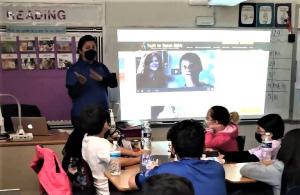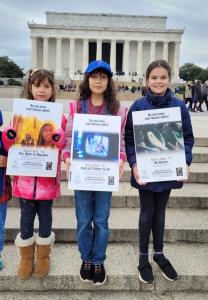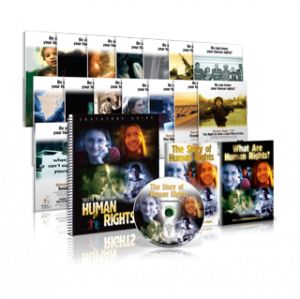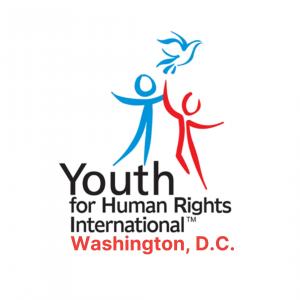Human Trafficking Month: Youth for Human Rights gives youth and adults vital tips on spotting and avoiding traffickers

Human rights training for youth with Youth for Human Rights volunteers delivering age-appropriate seminars on staying safe and protecting human rights.

Human traffickers look for kids who lack self-confidence. Human rights education makes kids more confident and thus less susceptible to traffickers.
Raising awareness about human trafficking during Human Trafficking Awareness Month: January
The State Department issues an annual report called the Trafficking in Persons (TIP) Report which details laws and actions being done around the world to fight against this crime. Many countries work hard to improve their TIP report entries by prosecuting traffickers and improving their laws.
The United States is not immune to this crime. Ensuring citizens are aware and know what to do when they see signs of trafficking is a large part of the battle against human trafficking.
Youth for Human Rights DC Chapter is helping parents, community groups, churches, and youth programs with tips on spotting trafficking signs and protecting their families from falling victim to this crime.
Knowing how to spot key indicators of sex trafficking and what to do about it is vital. Many victims of human trafficking are minors. Recognizing the signs of human trafficking is often the first step to identifying and helping a trafficking victim. Youth for Human Rights has created training on how to spot trafficking. This training includes learning to be alert to possible signs of sex trafficking, the largest form of trafficking in the US.
These signs include:
• Changes in school attendance, habits, friend groups, vocabulary, demeanor, and attitude
• Sudden appearance of luxury items, e.g., manicures, designer clothes, purses
• Sexually provocative clothing
• Tattoos or branding
• Refillable gift cards
• Multiple phones or social media accounts
• Lying about the existence of social media accounts
• Provocative pictures posted online or stored on the phone
• Unexplained injuries
• Social interaction and schedule being strictly controlled by someone else
• Isolation from family, friends, and community
Anyone can help report human trafficking by paying attention to the red flags listed above and reporting them to the police, school officials, or the national trafficking hotline. Individuals are cautioned not to approach traffickers themselves because they could put themselves in danger and jeopardize any future prosecution of the buyers or pimps.
If there is an emergency or immediate threat, call 911. If it is not an emergency or immediate threat, you can call the human trafficking hotline to report any suspected instances of human trafficking. It is better to call, and report suspected trafficking than not to report at all. By identifying victims and reporting tips, you are doing your part to help law enforcement rescue victims, and you might save a life. The contacts are: National Human Trafficking Hotline 1-888-373-7888 or text HELP or INFO to BeFree (233733).
Youth for Human Rights works to strengthen children’s confidence through human rights training. This also helps to prevent children from becoming victims of traffickers. Parents should know the importance of strengthening their child’s confidence to reduce their susceptibility to becoming trafficked.
Having done many training sessions with students, Youth for Human Rights Ambassador Erica Rodgers stated, “A solid understanding of human rights breeds confidence in youth. Pimps and recruiters don’t target confident youth. They look for the shy and insecure youth - the ones they can manipulate and control. By ensuring youth are confident and know how to protect their rights, we help prevent them from being the target of traffickers.”
Youth for Human Rights International has been working to prevent human trafficking on a national and international level for more than two decades. Ms. Rodgers said, “Raising awareness of human rights is the necessary undercut to this and so many other human rights issues.”
The Youth for Human Rights program is focused on the Universal Declaration of Human Rights. In that UN document, Article 4 states: “No one shall be held in slavery or servitude; slavery and the slave trade shall be prohibited in all their forms.”
To read all of the human rights as listed in the Universal Declaration of Human Rights go to: http://www.un.org/en/universal-declaration-human-rights.
About Youth for Human Rights:
Youth for Human Rights International (YHRI) is a nonprofit organization whose mission is to teach youth about human rights, specifically the United Nations Universal Declaration of Human Rights, and to inspire them to become valuable advocates for tolerance and peace. YHRI advocates for human rights both in the classroom and in nontraditional educational settings such as through art series, concerts, and other interactive community events, including regional and international human rights summits which bring youth together from across whole sectors of the world.
For a documentary on Youth for Human Rights International and its founder, go to https://www.scientology.tv/series/voices-for-humanity/mary-shuttleworth.html.
Press Office
Youth for Human Rights International - National Office
+1 202-667-6404
email us here
Legal Disclaimer:
EIN Presswire provides this news content "as is" without warranty of any kind. We do not accept any responsibility or liability for the accuracy, content, images, videos, licenses, completeness, legality, or reliability of the information contained in this article. If you have any complaints or copyright issues related to this article, kindly contact the author above.


